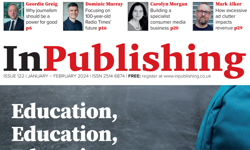
In the publishing sector’s ongoing efforts to reduce costs, we might be in danger of making choices that will damage our long term prospects.
This was one of the takeaways from our latest special feature – ‘content production and user experience’ – which will be published in the upcoming May / June issue of InPublishing magazine (which you can register to receive here).
Misguided cost cutting frequently falls into three areas:
- Selecting the cheapest supplier: whilst cost is always a key consideration, blindly choosing the cheapest option will likely lead to decreased productivity as the chosen supplier fails to perform to the required standard. When sourcing new suppliers, the key requirement is to select the right fit, not necessarily the cheapest fit.
- Replacing experienced staff with cheaper alternatives: Experienced staff cost more than inexperienced, but they also know a lot more. They have accumulated years of in-depth knowledge about operations, key supplier relationships, what works and what doesn’t and generally how to get things done. Replacing that knowledge can take years and, depending on how things pan out, might be lost for ever. The result is decreased productivity and performance.
- Cutting training budgets: always an early victim in cost cutting campaigns, but by cutting training, publishers are essentially leading their staff down a path of low productivity. Jobs will take longer to complete and will be done less well. And that bottle of magic sauce that brilliant, well-trained and motivated people bring to the table, will be empty.
Over-zealous cost cutting in these areas might take time to show its true impact. Deceptively, the initial signs might appear positive. If revenues hold steady for a while, then the reduced costs will result in increased profits in the short term.
The real kicker comes in the medium to long term, when performance issues start to negatively impact revenue and by that time, and because of the cuts made, publishers won’t have the resilience and expertise to put things right.
You can catch James Evelegh’s regular column in the InPubWeekly newsletter, which you can register to receive here.










